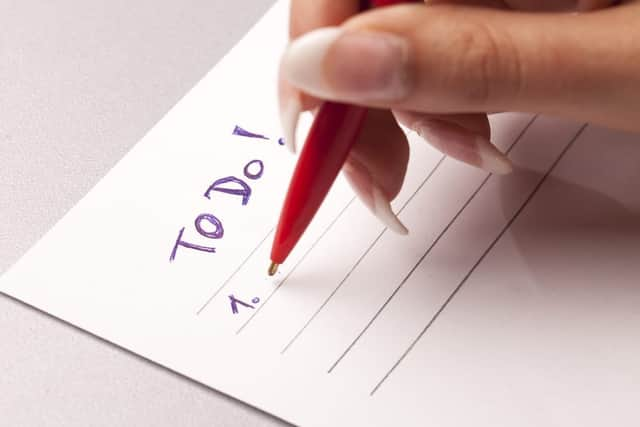Writing a 'to do' list just before bedtime 'helps people sleep better'


Writing out all the tasks you need to get done just before going to bed can be more effective than taking a sleeping pill, according to new research.
Experts dismiss 'to do' lists as a waste of time, because jobs usually end up taking longer than people think - so most are never completed.
Advertisement
Hide AdAdvertisement
Hide AdBut they can help people get a better night's sleep, and should be recommended to combat chronic shortage.


A study suggests jotting them down at night will help you to nod off. The more participants wrote their to-do list, the faster they subsequently fell asleep. The opposite trend was observed when they jotted down completed activities.
The former group got to sleep an average 9 minutes sooner, equivalent to sleeping pill studies, and slept seven minutes longer. They also awake much less often.
And those who wrote the most specific top-do lists got to sleep around 15 minutes faster.
Prof Michael Scullin, of Baylor University in the United States, said: "To facilitate falling asleep, individuals may derive benefit from writing a very specific to-do list for five minutes min at bedtime rather than journaling about completed activities."


The study, published in the Journal of Experimental Psychology, compared sleep patterns of 57 men and women aged 18 to 30 who took five minutes to write down upcoming duties, or chronicled completed activities.
Tasks to-do
Psychologist Prof Scullin, who is director of the Sleep Neuroscience and Cognition Laboratory at Baylor, said: "We live in a 24/7 culture in which our to-do lists seem to be constantly growing and causing us to worry about unfinished tasks at bedtime.
"Most people just cycle through their to-do lists in their heads, and so we wanted to explore whether the act of writing them down could counteract night time difficulties with falling asleep."
Advertisement
Hide AdAdvertisement
Hide AdSome 40 per cent of American adults report difficulty falling asleep at least a few times each month, according to the National Sleep Foundation.
Britain is one of the most sleep deprived nation's in the world, with almost four in ten struggling to get the recommended amount of at least seven hours.
Prof Scullin said: "There are two schools of thought about this. One is that writing about the future would lead to increased worry about unfinished tasks and delay sleep, while journaling about completed activities should not trigger worry.
"The alternative hypothesis is writing a to-do list will 'offload' those thoughts and reduce worry."
Electric dreams
Anecdotal evidence exists that writing a bedtime list can help one fall asleep. But this was the first to use a technique called overnight polysomnography, the "gold standard" where electrical brain activity is measured using electrodes.
Participants stayed in the lab on a week night to avoid weekend effects on bedtime and because on a weekday night, they probably had unfinished tasks to do the next day.
They were divided into two randomly selected groups and given five-minute writing assignments before retiring.
One was asked to write down everything they needed to remember to do the next day or over the next few days, and the other about those tasks they had completed recently. The student volunteers were told they could go to bed at 10:30 pm.
Advertisement
Hide AdAdvertisement
Hide AdThe 28 participants in the 'to-do' list group got to sleep on average after 16 minutes, compared to 25 minutes for the 29 others. They also slept for an average of 8 hours, 19 minutes, compared to 8 hours, 12 minutes.
Prof Scullin said: "The key seems to be that participants wrote their to-do list rather than mentally ruminated about their unfinished tasks.
"Expressive writing has been demonstrated to reduce anxiety and depression, though its impact on sleep onset latency has been a matter of debate."
He added: "Bedtime worry, including worrying about incomplete future tasks, is a significant contributor to difficulty falling asleep."
Drop-off time
Not only content, but also quantity, of writing was important. The more to-do list items that one wrote, the faster they fell asleep.
Prof Scullin said: "Writing your to-do list improves falling asleep by nine minutes on average, which is actually equivalent to what you see in some sleep medication studies.
"People who wrote very specific to-do lists in a sub analysis of the data fell asleep approximately 15 minutes quicker.
"We had them in a controlled environment. We absolutely restricted any technology, homework, etc. It was simply lights out after they got into bed.
Advertisement
Hide AdAdvertisement
Hide Ad"The present experiment highlights bedtime to-do list writing as a potentially beneficial, easily administered, behavioural sleep aid for young adults.
"In today's 24/7 society that emphasises work productivity, many individuals' to-do lists are extensive and incur substantial negative affect, anxiety and rumination.
"Rather than journal about the day's completed tasks or process tomorrow's to-do list in one's mind, the current experiment suggests individuals spend five minutes near bedtime thoroughly writing a to-do list."
He added: "Measures of personality, anxiety and depression might moderate the effects of writing on falling asleep, and that could be explored in an investigation with a larger sample.
"We recruited healthy young adults, and so we don't know whether our findings would generalise to patients with insomnia, though some writing activities have previously been suggested to benefit such patients."
Studies have shown that nearly two in three professionals write to-do lists, but just 41 per cent of the items on there actually get done.
Kevin Kruse, the author of 15 Secrets Successful People Know About Time Management, said none of the 200 billionaires, entrepreneurs or Olympians he has interviewed use to-do lists.